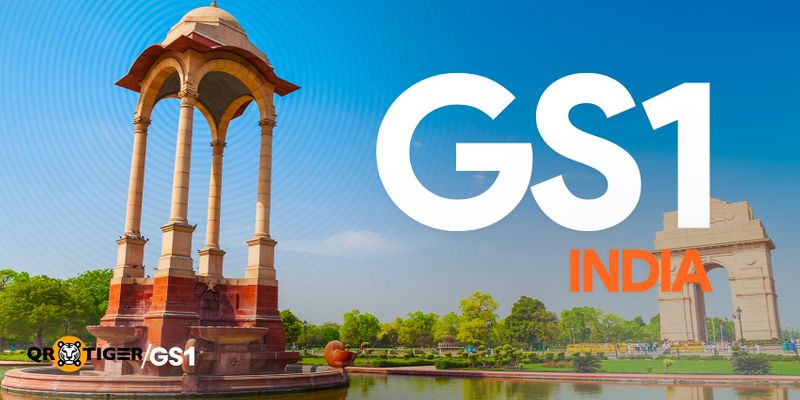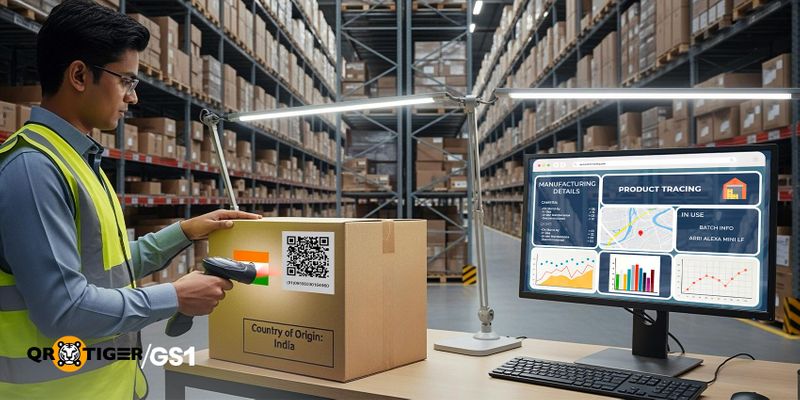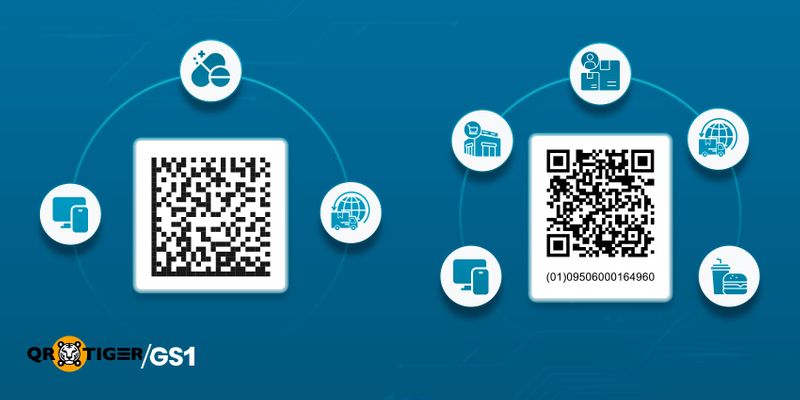GS1 India: Boosting Supply Chain Efficiency

Businesses today encounter challenges in managing inventory, optimizing logistics, and ensuring product authenticity. GS1 India provides internationally recognized standards that empower local industries, from retail to automotive to ensure supply chain operations.
By providing solutions such as barcoding, Global Trade Item Numbers (GTINs), and data standardization, GS1 in India enhances business cross-functionality, minimizes errors, and facilitates improved transparency and efficiency across the whole supply chain.
It uses 2D barcodes to improve operational accuracy, increase data capacity, and handle a variety of product information. In this article, we will discuss how GS1 in India transforms supply chain efficiency across industries.
Table of Contents
- What is GS1 India?
- Where to Obtain GTINs in India?
- Solutions and Collaborated Campaigns
- How GS1 Standards Enhance Supply Chain Transparency in India
- Applications of 2D barcodes across industries in India
- Inspiring success stories from GS1 India
- Guide to registering to GS1 IN
- Leverage GS1 Standards in India for smooth Supply Chain Operations
- FAQs
What is GS1 India?
GS1 India (IN) is a local chapter of a non-profit organization that provides guidance and support for implementing the global standards for efficient business communication. It was established in 1996 by the Ministry of Commerce and Industry along with CII, FICCI, ASSOCHAM, FIEO, IMC, BIS, Spices Board, APEDA, and IIP.
It helps Indian industry and government bodies to align with global best practices to ensure operational efficiency, supply chain visibility, and consumer safety.
As an official Member Organization (MO) of GS1 in India, it promotes and implements global GS1 standards to improve supply chain efficiency, product traceability, and data accuracy.
It also provides digital tools and services to businesses, while actively contributing to the goals of the Digital India initiative by supporting digitization, transparency, and innovation across sectors.
The organization aims to help businesses enhance their supply chain processes and efficiency via standardized systems.
Its mission is to let businesses uniquely identify products, locations, and share information in a standardized and organized manner.
Since its establishment, the GS1 IN has made remarkable developments in enhancing the trade and supply chain management processes contributing to the global and Indian economies.
Address: 330, 2nd floor 'C' Wing, August Kranti Bhawan - Bhikaji Cama Place, 110066, New Delhi, India
Contact no: + 91 (11) 6127 0890 / 4289 0890
Email: info@gs1india.org
Where to Obtain GTINs in India?
GS1 IN is the only certified body in India for allocating Global Trade Item Numbers (GTINs) starting with 890. It has been established as a standards organization by the Government of India, Ministry of Commerce and Industry, along with apex trade and Industry bodies, BIS.
It is an affiliate of GS1 Global, a Belgium-based GS1 organization that manages a network of 115 GS1 organizations globally.
GS1 Barcode is a 13-digit numeric code beginning with the prefix ‘890’. This prefix number with the barcode symbol is registered as a trademark of India’s GS1 body, and its illegal issue/use would lead to legal action.
Since the GS1 chapter in India is the only authorized body for GTINs, you must not be misled by other organizations/agencies claiming to provide GTINs at reduced costs. The barcode numbers you get from them will not be considered valid by retailers and other stakeholders (business owners, manufacturers, service providers, etc.).
Solutions and Collaborated Campaigns
National Industry Forum for Retail
The National Industry Forum for Retail brings together key players in India’s retail ecosystem, including brand owners, retailers, and e-commerce platforms, to jointly address operational challenges and streamline supply chain practices.
Rather than working in isolation, members collaborate to enhance consumer experience, improve efficiency, and support the growth of omnichannel retail across the country.
GS1 IN plays a key role in facilitating this initiative. It coordinates meetings, guides project execution, and also helps participants adopt globally recognized standards that improve product data accuracy, logistics, and inventory management.
By coming together on this collaborative platform, industry participants can share practical insights and implement consistent standards that improve supply chain visibility and trade performance.
ROHINI: A Collaborative Solution for Healthcare Efficiency
ROHINI is a nationwide registry that assigns unique IDs to approximately 33,000 hospitals and medical day-care centers within insurer and Third Party Administrators (TPAs) networks.
Developed by the Information Bureau of India (IIB and backed by the Insurance Regulatory Development Authority of India (IRDAI), ROHINI makes sure each facility is given a 13-digit GS1 Global Location Number (GLN) with geo-coded details to prevent duplicate entries.
This helps accelerate insurance claims and ensures accurate hospital identification. All cashless network hospitals must register on ROHINI.
DataKart: An Integrated Solution for Product Data Management
GS1 IN’s DataKart is a digital platform that helps businesses store all their product details in one place. Brand owners can use it to share correct and uniform information with online stores, retailers, and government bodies.
Each product gets a special code (GTIN) to simplify listing, shelf planning, and meeting legal label rules. This system also simplifies tasks like stock management and quick product recalls.
As a collaborative solution, DataKart connects manufacturers, sellers, and service providers by creating a clear and organized way to share product data. It saves time, reduces errors, and builds trust across the supply chain, helping stakeholders work more efficiently.
Smart Consumer: Empowering Transparency
GS1 IN’s Smart Consumer mobile app helps people get accurate product details by scanning barcodes. It shows trusted information like stock availability, offers, contact info, and customer reviews. It uses data from GS1 IN’s DataKart, helping shoppers make better choices and trust what they buy.
As a collaborative effort, the app allows brands to connect directly with customers. It serves as a useful tool for sharing genuine product data and promotions, helping both businesses and consumers build stronger relationships through transparency.
How GS1 Standards Enhance Supply Chain Transparency in India

GS1 standards significantly enhance supply chain efficiency and ensure product authenticity in the country. Businesses can adopt these standards to reduce errors, streamline operations, and build customer trust. Here are some remarkable advantages of using these standards in India.
Optimized product identification and traceability
In the diverse and expanding market of India, GTINs and GS1 barcodes enable accurate product identification. This makes it simpler to track products throughout the supply chain.
The product identification is particularly vital for retail, pharmaceuticals, and food safety, where traceability helps avoid counterfeiting, ensures compliance with government regulations, and enhances supply chain transparency. By using a GS1 QR code generator, businesses can create GS1 Digital Link QR codes for improved product tracking and consumer engagement.
Enhanced supply chain and inventory management
Indian businesses, ranging from startups to large corporations, benefit from GS1 standards by optimizing stock levels, automating inventory tracking, and reducing wastage.
Manufacturers, retailers, and logistics providers get real-time visibility, leading to improved operational efficiency and decision-making.
Improved customer trust and brand credibility
With India’s developing e-commerce sector and growing consumer awareness, the GS1 standards make sure the product data is globally recognized, consistent, and verified.
As a result, brands can establish credibility, enabling consumers to access accurate product information, confirm product authentication, and make informed buying decisions. So, this leads to enhanced customer trust and satisfaction.
Compliance with Global & local regulations
Industries such as retail, food, and healthcare rely on GS1 standards to conform to government and industry regulations. The Food Safety and Standards Authority of India (FSSAI) and pharmaceutical regulatory bodies recommend GS1 barcoding for product tracking, labeling, and safety compliance, helping businesses meet national and global standards.
Improved e-commerce & digital integration
India’s flourishing e-commerce platforms use GS1 standards to authenticate product listings, avoid duplicate GTINs, and enhance search visibility. This enhances the digital shopping experience and guarantees precise product details, benefiting both businesses and consumers.
Applications of 2D barcodes across industries in India
GS1 Sunrise 2027 is the global industry initiative to adopt 2D barcodes in supply chain systems and point-of-sale (POS). This project intends to make products smarter, with GS1 US as the key influencer.
The shift from traditional 1D barcodes (like UPC/EAN) to 2D barcodes (like GS1 Data Matrix and GS1 QR code) is already happening in multiple countries, including Canada, Germany, etc., and across industries.
It’s not a strict deadline but a collective industry effort to prepare systems for the upcoming generation of barcodes.

Retail and E-commerce
The retail sector in India is continuously growing. GS1 standards for unique identification, standardized capturing, and sharing of reliable data for products can help retailers provide a smooth consumer experience while simultaneously improving process efficiency.
GS1 retail barcodes facilitate end-to-end traceability of the product for consumer engagement.
India’s GS1 body services help sellers in expanding their market presence by listing with online marketplaces and strengthening product data with a unique product identity. The brand owners can easily share the product data with e-commerce marketplaces through DataKart.
DataKart is a database of information on retail products with information on each attribute (ingredient, MRP, product image, net content, dimension, etc.).
Healthcare
GS1 standards—particularly GS1 DataMatrix barcodes play a key role in India’s healthcare sector by enabling offline access to critical product data such as batch numbers, serial numbers, and expiry dates.
Pharmacies and hospitals use these barcodes for device tracking, accurate medication verification, and counterfeit prevention, all integrated directly into internal systems without requiring internet connectivity.
Although GS1 Digital Link is more widely applied in retail for online consumer engagement, its core identifiers like GTINs support regulatory compliance, inventory management, and secure traceability in healthcare settings while simultaneously maintaining compatibility with pharmacy systems.
Warehouse Operations & Logistics
The industry in India supports value-added transport and warehouse management solutions that optimize the movement of goods from suppliers to manufacturers to customers.
With GS1 Standards, transportation and logistics teams get more visibility by standardizing information and automating its collection. The standards enable teams to focus more on how to use information rather than how to obtain information.
GS1 standards have played a vital role in the success of various projects. Indian Highways Management Company Limited (IHMCL) adopted GS1 standards in the fastags for smooth electronic toll, on national highways.
The standards help Indian Railways to track its coaches, wagons, and locomotives across the rail network in real time. So, they ensure enhanced reliability of their services.
Food and Agriculture
Food brands in the country use 2D barcodes to enhance traceability from farm to table, ensuring quality control and compliance with safety regulations.
Consumers can easily scan barcodes to verify product authenticity, get nutritional information, and trace the origin of ingredients. So, the standards foster customer trust and transparency.
Logistics & Supply Chain
2D barcode standards help logistics companies track shipments, improve inventory accuracy, and optimize warehouse operations. The integration of barcode scanning with digital systems enables businesses to automate processes, reduce errors, and improve operational efficiency.
Inspiring success stories from GS1 India
Here are a few real use cases:Sangani Industries revolutionized rubber band manufacturing
Ravish Sangani, a Coimbatore-based entrepreneur, struggled with obsolete practices in the rubber band industry. While seeking a solution, he connected with India’s GS1 body to get unique barcodes for his products, ensuring improved supply chain visibility.
By adopting GS1 barcodes, the Sangani industries enhanced the brand’s credibility. They also gained other benefits like accurate and faster billing to improve customer satisfaction, error-free dispatches to save time and effort, and improved online search visibility to boost product discovery.
Bigbasket enhanced the product data accuracy
Bigbasket, India’s largest online food and grocery store, uses DataKart and its global extension, Verified by GS1, to validate GTINs, verify brand ownerships, track product updates, and refine its catalogue.
These services help retailers maintain accurate listings and respond to brand changes in real time. By checking GTINs before onboarding products, Bigbasket recognizes duplicates faster, reduces catalogue errors by 80%, and speeds up product listings, as most data is preloaded to DataKart. This streamlines operations and reduces redundant work for brands.
Guide to registering to GS1 IN
Here are steps that businesses can follow for GS1 registration.
GS1 IN provides barcode bundles in capacities like 100, 1,000, 10,000, or 1,00,000. The fee depends on your company’s turnover and subscription duration. Make sure to carefully assess your current and future product variants (SKUs) before selecting the quantity, because it can’t be changed later.
1) Begin with GS1 Registration: To get started, visit GS1 India’s registration portal and create an account. You’ll need to submit your business details, upload required documents (such as PAN, GST certificate, and turnover proof) and choose a subscription plan based on your barcode needs.
2) Access GS1 Services Post-Registration: Once registered, you’ll obtain a Global Company Prefix (GCP) that allows you to generate unique product identifiers (GTINs/EANs). These identifiers support smooth integration into point of sale, ensuring your products are easily scannable across retail counters.
Your subscription also includes access to DataKart, GS1 IN’s centralized product data management platform. Through DataKart, you can assign barcodes, manage product attributes (like dimensions, MRP, ingredients), and share standardized data with e-commerce platforms and retailers in real time. This ensures traceability, consistency, and compliance across supply chains.
Key considerations for registration
Here are some key considerations you must know when registering for GS1 IN:
- Registration timeline: Once you submit the completed registration form, required documents (like PAN, GST certificate, and turnover proof), and pay the applicable fee. GS1 IN typically processes your application within 7–10 working days.
- Eligibility criteria: Only brand owners, i.e., those who legally own and market the product, are eligible to apply for GS1 barcode numbers. If you're a third-party seller or a distributor, you should apply separately for each brand or company you represent.
- Planning barcode quantity: Before applying for registration, you must determine your total number of SKUs, including color, size, and packaging variants. Also consider the estimated product launches over the next few years. This helps prevent underestimating your barcode needs.
- No modification once allocated: Once barcode numbers are allotted, you can’t upgrade or downgrade the quantity. If you exhaust your allocation, you’ll need to register again to obtain a new set of barcodes.
- Renewal requirement: GS1 barcode subscriptions are valid for a fixed period (usually 1–10 years). You must renew before expiry to continue using your barcode numbers and retain access to tools like DataKart. Note that late renewals may lead to penalties or termination.
Leverage GS1 Standards in India for smooth Supply Chain Operations
GS1 standards are vital in supply chain operations across industries by ensuring smooth traceability, accurate product identification, and improved data transparency.
Businesses can adopt these globally recognized GS1 solutions to streamline logistics, enhance the efficiency of their operations, and build trust with consumers. A business entity can join GS1 India to ensure smooth integration of GS1-compliant QR codes, improved workflow, and global compliance.
FAQs
Why is GS1 IN significant for local businesses?
India’s GS1 body is significant for businesses because it facilitates end-to-end traceability, improves transparency, and builds trust throughout the supply chain.
Can I get GTINs from any other organization in India?
GTINs starting with the 890 prefix can only be issued by GS1 IN, the country’s sole authorized body set up by the Ministry of Commerce and Industry, along with BIS, the apex trade and industry body.
The 13-digit barcode starting with ‘890’ is a registered trademark of GS1 IN, and using fake or unauthorized codes can lead to legal trouble. Be vigilant of agencies offering cheap barcode numbers as they aren’t valid for retail or online platforms and could harm your product’s credibility.
Why subscribe to GS1 India?
Subscribing to the GS IN provides your business access to globally recognized barcodes. It streamlines product management through DataKart, where you can easily generate and manage barcodes.
Your GTINs also become verifiable by retailers and online platforms, ensuring fewer errors and smooth operations. They also help with barcode implementation and let you engage directly with customers to get feedback and strengthen brand credibility.
For micro enterprises, there’s up to 80% financial support on registration and annual fees for the first three years.
 DISCLAIMER: We acknowledge that GS1, as well as the materials, proprietary items, and all related patents, copyright, trademark, and other intellectual property (collectively, “intellectual property”) relating to its use, are the property of GS1 Global, and that our use of the same shall be in accordance with the conditions provided by GS1 Global.
DISCLAIMER: We acknowledge that GS1, as well as the materials, proprietary items, and all related patents, copyright, trademark, and other intellectual property (collectively, “intellectual property”) relating to its use, are the property of GS1 Global, and that our use of the same shall be in accordance with the conditions provided by GS1 Global.



